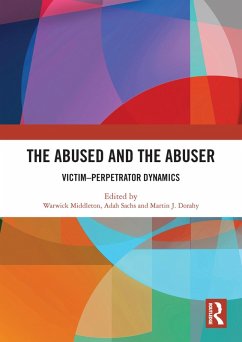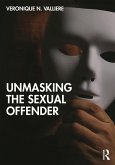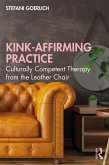The Abused and the Abuser (eBook, ePUB)
Victim-Perpetrator Dynamics
Redaktion: Middleton, Warwick; Dorahy, Martin J.; Sachs, Adah
40,95 €
40,95 €
inkl. MwSt.
Sofort per Download lieferbar

20 °P sammeln
40,95 €
Als Download kaufen

40,95 €
inkl. MwSt.
Sofort per Download lieferbar

20 °P sammeln
Jetzt verschenken
Alle Infos zum eBook verschenken
40,95 €
inkl. MwSt.
Sofort per Download lieferbar
Alle Infos zum eBook verschenken

20 °P sammeln
The Abused and the Abuser (eBook, ePUB)
Victim-Perpetrator Dynamics
Redaktion: Middleton, Warwick; Dorahy, Martin J.; Sachs, Adah
- Format: ePub
- Merkliste
- Auf die Merkliste
- Bewerten Bewerten
- Teilen
- Produkt teilen
- Produkterinnerung
- Produkterinnerung

Bitte loggen Sie sich zunächst in Ihr Kundenkonto ein oder registrieren Sie sich bei
bücher.de, um das eBook-Abo tolino select nutzen zu können.
Hier können Sie sich einloggen
Hier können Sie sich einloggen
Sie sind bereits eingeloggt. Klicken Sie auf 2. tolino select Abo, um fortzufahren.

Bitte loggen Sie sich zunächst in Ihr Kundenkonto ein oder registrieren Sie sich bei bücher.de, um das eBook-Abo tolino select nutzen zu können.
This book comprehensively covers victim-perpetrator dynamics, drawing together international experts who have spent much of their careers studying the nature of the relationship between the abused and the abuser(s). This book was originally published as a special issue of the Journal of Trauma and Dissociation .
- Geräte: eReader
- ohne Kopierschutz
- eBook Hilfe
- Größe: 1.54MB
Andere Kunden interessierten sich auch für
![The Abused and the Abuser (eBook, PDF) The Abused and the Abuser (eBook, PDF)]() The Abused and the Abuser (eBook, PDF)40,95 €
The Abused and the Abuser (eBook, PDF)40,95 €![Unmasking the Sexual Offender (eBook, ePUB) Unmasking the Sexual Offender (eBook, ePUB)]() Veronique N. ValliereUnmasking the Sexual Offender (eBook, ePUB)33,95 €
Veronique N. ValliereUnmasking the Sexual Offender (eBook, ePUB)33,95 €![When Art Therapy Meets Sex Therapy (eBook, ePUB) When Art Therapy Meets Sex Therapy (eBook, ePUB)]() Einat S. MetzlWhen Art Therapy Meets Sex Therapy (eBook, ePUB)37,95 €
Einat S. MetzlWhen Art Therapy Meets Sex Therapy (eBook, ePUB)37,95 €![Psychosis and The Traumatised Self (eBook, ePUB) Psychosis and The Traumatised Self (eBook, ePUB)]() John RhodesPsychosis and The Traumatised Self (eBook, ePUB)29,95 €
John RhodesPsychosis and The Traumatised Self (eBook, ePUB)29,95 €![Sex Therapy with Religious Patients (eBook, ePUB) Sex Therapy with Religious Patients (eBook, ePUB)]() Caleb JacobsonSex Therapy with Religious Patients (eBook, ePUB)31,95 €
Caleb JacobsonSex Therapy with Religious Patients (eBook, ePUB)31,95 €![Alternatives to Domestic Violence (eBook, ePUB) Alternatives to Domestic Violence (eBook, ePUB)]() Kevin A. FallAlternatives to Domestic Violence (eBook, ePUB)30,95 €
Kevin A. FallAlternatives to Domestic Violence (eBook, ePUB)30,95 €![Kink-Affirming Practice (eBook, ePUB) Kink-Affirming Practice (eBook, ePUB)]() Stefani GoerlichKink-Affirming Practice (eBook, ePUB)33,95 €
Stefani GoerlichKink-Affirming Practice (eBook, ePUB)33,95 €-
-
-
This book comprehensively covers victim-perpetrator dynamics, drawing together international experts who have spent much of their careers studying the nature of the relationship between the abused and the abuser(s). This book was originally published as a special issue of the Journal of Trauma and Dissociation.
Dieser Download kann aus rechtlichen Gründen nur mit Rechnungsadresse in A, B, BG, CY, CZ, D, DK, EW, E, FIN, F, GR, HR, H, IRL, I, LT, L, LR, M, NL, PL, P, R, S, SLO, SK ausgeliefert werden.
Produktdetails
- Produktdetails
- Verlag: Taylor & Francis
- Seitenzahl: 278
- Erscheinungstermin: 23. Oktober 2019
- Englisch
- ISBN-13: 9781351213967
- Artikelnr.: 57966572
- Verlag: Taylor & Francis
- Seitenzahl: 278
- Erscheinungstermin: 23. Oktober 2019
- Englisch
- ISBN-13: 9781351213967
- Artikelnr.: 57966572
- Herstellerkennzeichnung Die Herstellerinformationen sind derzeit nicht verfügbar.
Warwick Middleton was the primary author of the first published series on patients with dissociative identity disorder to appear in the Australian scientific literature. For over 20 years, he has been the Foundation Director of the Trauma and Dissociation Unit, Belmont Hospital. He is a pioneer researcher in the area of ongoing incest during adulthood; he chairs the Cannan Institute; and is a past president of the International Society for the Study of Trauma and Dissociation. Adah Sachs is an attachment-based psychoanalytic psychotherapist. Her main theoretical contribution is outlining several subcategories of disorganised attachment, and linking those with childhood abuse and with trauma-based mental disorders. She is an NHS consultant and heads the Psychotherapy Service for Redbridge Borough, London, UK. Martin J. Dorahy is Director of the clinical psychology programme at the University of Canterbury, New Zealand, and current immediate past-president (2018) of the International Society for the Study of Trauma and Dissociation. His published work has primarily explored cognitive and emotional underpinnings of dissociation and dissociative disorders, with a particular focus on shame. His clinical work is focused on the adult outcomes of abuse and neglect.
Introduction - The abused and the abuser: Victim-perpetrator dynamics 1.
Weaponized sex: Defensive pseudo-erotic aggression in the service of safety
2. Extreme adaptations in extreme and chronic circumstances: The
application of "weaponized sex" to those exposed to ongoing incestuous
abuse 3. Conflicts between motivational systems related to attachment
trauma: Key to understanding the intra-family relationship between abused
children and their abusers 4. Through the lens of attachment relationship:
Stable DID, active DID and other trauma-based mental disorders 5. Dying for
love: An attachment problem with some perpetrator introjects 6. Predicting
a dissociative disorder from type of childhood maltreatment and
abuser-abused relational tie 7. Victim-perpetrator dynamics through the
lens of betrayal trauma theory 8. Shame as a compromise for humiliation and
rage in the internal representation of abuse by loved ones: Processes,
motivations, and the role of dissociation 9. Knowing and not knowing: A
frequent human arrangement 10. Mother-child incest, psychosis, and the
dynamics of relatedness 11. Dissociation in families experiencing intimate
partner violence 12. Organized abuse in adulthood: Survivor and
professional perspectives 13. Treatment strategies for programming and
ritual abuse 14. Issues in consultation for treatments with distressed
activated abuser/protector self-states in dissociative identity disorder
15. Wilhelm Fliess, Robert Fliess, Ernest Jones, Sandor Ferenczi and
Sigmund Freud Endnote - A personal perspective: The response to child abuse
then and now
Weaponized sex: Defensive pseudo-erotic aggression in the service of safety
2. Extreme adaptations in extreme and chronic circumstances: The
application of "weaponized sex" to those exposed to ongoing incestuous
abuse 3. Conflicts between motivational systems related to attachment
trauma: Key to understanding the intra-family relationship between abused
children and their abusers 4. Through the lens of attachment relationship:
Stable DID, active DID and other trauma-based mental disorders 5. Dying for
love: An attachment problem with some perpetrator introjects 6. Predicting
a dissociative disorder from type of childhood maltreatment and
abuser-abused relational tie 7. Victim-perpetrator dynamics through the
lens of betrayal trauma theory 8. Shame as a compromise for humiliation and
rage in the internal representation of abuse by loved ones: Processes,
motivations, and the role of dissociation 9. Knowing and not knowing: A
frequent human arrangement 10. Mother-child incest, psychosis, and the
dynamics of relatedness 11. Dissociation in families experiencing intimate
partner violence 12. Organized abuse in adulthood: Survivor and
professional perspectives 13. Treatment strategies for programming and
ritual abuse 14. Issues in consultation for treatments with distressed
activated abuser/protector self-states in dissociative identity disorder
15. Wilhelm Fliess, Robert Fliess, Ernest Jones, Sandor Ferenczi and
Sigmund Freud Endnote - A personal perspective: The response to child abuse
then and now
Introduction - The abused and the abuser: Victim-perpetrator dynamics 1.
Weaponized sex: Defensive pseudo-erotic aggression in the service of safety
2. Extreme adaptations in extreme and chronic circumstances: The
application of "weaponized sex" to those exposed to ongoing incestuous
abuse 3. Conflicts between motivational systems related to attachment
trauma: Key to understanding the intra-family relationship between abused
children and their abusers 4. Through the lens of attachment relationship:
Stable DID, active DID and other trauma-based mental disorders 5. Dying for
love: An attachment problem with some perpetrator introjects 6. Predicting
a dissociative disorder from type of childhood maltreatment and
abuser-abused relational tie 7. Victim-perpetrator dynamics through the
lens of betrayal trauma theory 8. Shame as a compromise for humiliation and
rage in the internal representation of abuse by loved ones: Processes,
motivations, and the role of dissociation 9. Knowing and not knowing: A
frequent human arrangement 10. Mother-child incest, psychosis, and the
dynamics of relatedness 11. Dissociation in families experiencing intimate
partner violence 12. Organized abuse in adulthood: Survivor and
professional perspectives 13. Treatment strategies for programming and
ritual abuse 14. Issues in consultation for treatments with distressed
activated abuser/protector self-states in dissociative identity disorder
15. Wilhelm Fliess, Robert Fliess, Ernest Jones, Sandor Ferenczi and
Sigmund Freud Endnote - A personal perspective: The response to child abuse
then and now
Weaponized sex: Defensive pseudo-erotic aggression in the service of safety
2. Extreme adaptations in extreme and chronic circumstances: The
application of "weaponized sex" to those exposed to ongoing incestuous
abuse 3. Conflicts between motivational systems related to attachment
trauma: Key to understanding the intra-family relationship between abused
children and their abusers 4. Through the lens of attachment relationship:
Stable DID, active DID and other trauma-based mental disorders 5. Dying for
love: An attachment problem with some perpetrator introjects 6. Predicting
a dissociative disorder from type of childhood maltreatment and
abuser-abused relational tie 7. Victim-perpetrator dynamics through the
lens of betrayal trauma theory 8. Shame as a compromise for humiliation and
rage in the internal representation of abuse by loved ones: Processes,
motivations, and the role of dissociation 9. Knowing and not knowing: A
frequent human arrangement 10. Mother-child incest, psychosis, and the
dynamics of relatedness 11. Dissociation in families experiencing intimate
partner violence 12. Organized abuse in adulthood: Survivor and
professional perspectives 13. Treatment strategies for programming and
ritual abuse 14. Issues in consultation for treatments with distressed
activated abuser/protector self-states in dissociative identity disorder
15. Wilhelm Fliess, Robert Fliess, Ernest Jones, Sandor Ferenczi and
Sigmund Freud Endnote - A personal perspective: The response to child abuse
then and now







